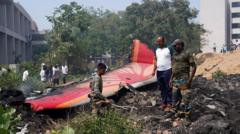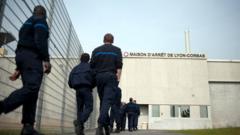Investigators have successfully retrieved data from the flight recorders of Air India Flight 171 that crashed shortly after takeoff from Ahmedabad. The analysis, aided by international experts, is underway to determine the accident's causes.
Data Recovered from Crashed Air India Flight Recorders in Critical Investigation

Data Recovered from Crashed Air India Flight Recorders in Critical Investigation
The recovery of flight recorder data from the Air India Boeing 787 crash is crucial for understanding the incident that resulted in significant loss of life.
Investigators have confirmed the recovery of data from the flight recorders involved in the tragic crash of Air India Flight 171, achieving a significant milestone in the ongoing investigation. This incident, which occurred on June 12 shortly after takeoff from Ahmedabad airport, reportedly resulted in the loss of at least 270 lives.
The Boeing 787-8 Dreamliner was en route to London when it crashed less than a minute into its flight. Following the disaster, investigators promptly retrieved both Enhanced Airborne Flight Recorders (EAFRs), commonly referred to as "black boxes," from the crash site on two separate occasions: 13 and 16 June. One unit was located on a rooftop while the other was found among the scattered debris.
According to experts, it might take several weeks before the Indian authorities are ready to disclose the information gleaned from these recorders. The specific aircraft model is equipped with dual recorders, which serve to facilitate comprehensive flight analysis and data collection. They meticulously track various operational metrics, such as the gear and flap lever positions, thrust settings, engine performance, and fuel flow, as well as capturing cockpit audio and communications between pilots.
On Wednesday, a team from India's Aircraft Accident Investigation Bureau (AAIB), supported by experts from the US National Transportation Safety Board (NTSB), successfully accessed the data. The Ministry of Civil Aviation stated, "The analysis of the Cockpit Voice Recorder (CVR) and Flight Data Recorder (FDR) is underway to reconstruct the sequence of events leading to the accident and to identify any contributing factors for future aviation safety."
In a supportive comment, Jennifer Homendy, chair of the NTSB, expressed hope that the Indian government would swiftly share pertinent details from the investigation, emphasizing the importance of public awareness and safety in aviation. She acknowledged the excellent cooperation received from Indian authorities in this difficult time.
The timeline for accessing and analyzing the crucial flight data has raised questions amongst aviation experts, some labeling the delay as unusual. Flight 171, which was airborne for under 40 seconds, tragically crashed into a densely populated neighborhood in Ahmedabad, resulting in almost all 242 passengers onboard losing their lives, marking one of the most perplexing air disasters in India’s recent history. The flight's captain and co-pilot issued a mayday call shortly after departure at 1:39 PM local time, marking its final communication before the tragedy unfolded.






















